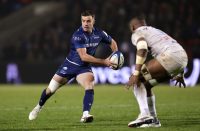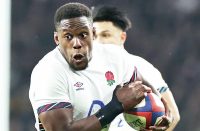 Danny Cipriani has found himself in the headlines over the last few weeks, but they have not been of his own making. Sir Clive Woodward’s decision to include England‘s prodigal son at fly-half in his team for the autumn series kept his name in the spotlight last weekend, but it started with Cipriani’s return to the Premiership coinciding with a disastrous opening to the season by Sale, the club who brought him back from Australia as their new star signing.
Danny Cipriani has found himself in the headlines over the last few weeks, but they have not been of his own making. Sir Clive Woodward’s decision to include England‘s prodigal son at fly-half in his team for the autumn series kept his name in the spotlight last weekend, but it started with Cipriani’s return to the Premiership coinciding with a disastrous opening to the season by Sale, the club who brought him back from Australia as their new star signing.
If Cipriani was looking for a test of character he could not have done better than re-launch his career in England by leaving the Rebels, tail-enders in the Super 15, for Sale, bottom of the Premiership. The first two months of this season have been no cakewalk with coaches blowing in, out and around the club like leaves in the autumn wind, but this time Cipriani’s name has been incidental to the story, rather than central to it – and there are signs that after two seasons of playing for Australia’s newest franchise, he has returned to Sale a tougher, wiser customer.
Ask if he is flattered that Woodward included him in his England team and he says simply: “You’ve got to be. I first came across Clive when I was in the junior system, and to have someone of such calibre and such respect pick you is very pleasing.”
Having departed the Premiership after divining that his England career was going nowhere in the Martin Johnson era, Cipriani left these shores labelled as a talented wastrel who had got the early trappings of rugby stardom hopelessly tangled with being part of a showbiz soap-opera. That image was not dispelled when the fly-half was suspended a couple of times by the Rebels after breaking their squad curfew, and despite flashes of the attacking brilliance that earned him seven England caps in 2008, his reputation for being defensively frail had become a regular talking point by the time he decided that his future lay in Manchester rather than Melbourne.
However, the idea of Cipriani, who has just turned 25, being a faint-heart has definitely lost currency in recent weeks with Sale’s star summer signing buckling down to help his new club. The first sign that he was digging-in came when, after four consecutive defeats, he was dropped for the visit to Bath in favour of Nick Macleod and, rather than sulking, he produced a second-half cameo off the bench which threatened to halt the home side’s momentum.
Having been benched again for the home Heineken Cup opener against Cardiff Blues, Cipriani responded with a 30-minute second- half masterclass to not only earn Sale their first win of the season, but also score his first try for the club, and make a second, to turn a 27-12 deficit into a 34-33 victory.
That man-of-the-match performance appeared to instil some belief and self-confidence into Sale. After a battling Heineken defeat at Montpellier and a narrow away loss at Worcester, they finally broke their Premiership duck last weekend with a 21-9 win over London Irish at Salford City Stadium. Cipriani again helped to steer the club over the line, with the fly-half first putting Macleod in for a try and then producing a shimmy and a devastating late off-load to send Jonny Leota barrelling through. He rounded off his account with two second-half penalties putting Sale clear.

Cipriani’s early reflections on the maelstrom he has been pitched into at Sale – with forwards coach Steve Scott sacked, John Mitchell appointed as a consultant, Bryan Redpath demoted to head coach, and chief executive Steve Diamond taking over as overall rugby director – are less about himself than the team-spirit in adversity he has discovered.
“The boys have stuck together really tight – Northerners stick to it, and there are no egos. There’s been a lot more detail in training, which is better, and on paper we have a very strong squad. There are some great players at Sale, and in terms of work ethic you don’t get better than Dave Seymour and Mark Cueto. As for Sam Tuitupou, I don’t know how he pulls on his boots every Saturday – he is a workhorse who shows real resilience. He has a durability that young players should respect.
“It’s been hard to impress given our start to the season but young front rowers like Ross Harrison, a prop who has only just come into the side, and hooker Tommy Taylor have really handled the step-up well. I’m enjoying life in Manchester, which is a good city, and it’s only a couple of hours away from friends and family in London. The only thing that is lacking a bit is Mark Cueto’s banter, but you can’t have everything.”
As for his own return to the Premiership’s promotion-relegation realities he says, “It’s been good. It’s enjoyable to be back, although it’s been tough for the team. Being away from home for two years you feel older and more responsible. It is all part of growing up and having to fend for yourself. I also learned a lot on the rugby front, and it was good to be able the bounce ideas off coaches and players in a different environment.”
He elaborates: “When I came back from breaking my ankle I was as quick within five or six months, and two years in Australia helped maintain that. Being on fast tracks gave me confidence, and I worked hard on my footwork. In the Super 15 they try to preserve space and give themselves a chance to beat an opponent one-on-one, and it is something they practice a lot in training. In the northern hemisphere we tend to practice kicking a lot more. There’s no right or wrong, it’s simply because Jonny Wilkinson is such a great kicker and role model that people tend to go in that direction, but down there they concentrate more on their footwork because they want to be the next Benji Marshall.”
Cipriani’s decision to join Sale rather than return to a London club has met with some surprise, especially given his formative years at Wasps and his family being down south — so what made him go north?
“I could have gone to a London club, but it would have been too easy – added to which, a guy like Steve Diamond could sell you sand on a beach. There’s a real vision at this club, and my view of it hasn’t changed just because we have had a tough start to the season. Professional rugby is tough when vital things are not happening. We’ve learned that we could have done things better in pre-season, but now the guys are responding by taking responsibility.”
Cipriani says that the conditions are different to those in the Super 15, neither harder or easier, but he believes that the two wins over the past month have been the product of a greater emphasis within the Sale squad on self-help: “There’s been a bit more onus on players doing analysis, as in doing their own homework. You need to be responsible for your own performance, and not just nod your head in team meetings.”
He says that he has had a head-start in that department thanks to his early schooling by Brian Ashton at the England academy: “Not many players are lucky enough to be educated by someone like Brian Ashton, and all of those who were tend to have a good understanding of how the game should be played.”
Cipriani reveals that he considers Mitchell, the controversial former All Black coach, whose arrival at Sale is rumoured to be imminent, to have similar credentials. “I’ve spoken to people like Matt Giteau and James O’Connor because it was John Mitchell who brought them up as players at Western Force. Yes, he’s a tough man, but they speak well of him. Mitchell is of the Brian Ashton calibre as a coach and as a student of the game.”
The Sale fly-half is unfazed by the reports of Mitchell’s bust up with players at the Golden Lions which led to his suspension by the Jo’burg based franchise, and says that he has already benefitted from his advice, especially in defence, where he admits he can be guilty of taking his eye off the ball – or, at least, the ball-carrier.
“Sometimes I’m thinking a step ahead of the play and I take my eye off my man and what’s happening in front of me. John Mitchell has looked at things in a consultancy role for Sale and his advice to me was not to over-read the play and to defend the channel, so that even when there is a lot of movement you deal in the moment and take your man.”
However, Cipriani does not concede that his defence is a serious drawback. “I’m trying to improve in all areas as a player. That includes working on defensive issues. Sometimes I’ve felt that the criticism of me in defence has been a bit much, and some critics have just needed something to say rather than see that I am making my tackles. You cannot hide in the defensive line.”

Another mentor with a significant input into Cipriani’s career is conditioning expert Margot Wells, and she attacks his critics for unbalanced reporting.
“What the media do in rugby is label people. Of course he can tackle, just look at the 2007 Heineken Cup final when he took out (Alesana) Tuilagi. As for Jonny Wilkinson, he couldn’t run fast, and God bless his cotton socks, he compensated for it by building up his power and tackling like a demon. I’ve watched Nick Evans miss tackles and no one says a thing, but when Danny Cipriani misses a tackle we see it replayed 25 times. I think the media has more of a problem than Danny – he makes a lot of cover tackles but gets no praise.”
Wells says that when she first started working with Cipriani as a teenager he was faced with obstacles, which have been overcome.
“When I first coached Danny he wore a scrum-cap because he kept getting knocked-out. Now he doesn’t wear one, and it stopped being an issue for him when he was 19. It was a physical problem. His head was too far ahead of his shoulders when he tackled, so there was no support along the brace of his shoulders. I fixed that by strengthening his neck muscles and lower back muscles, and repositioned his head going into contact.”
So far, Cipriani looks as if he is adjusting to carrying the load at Sale, and he says the next task is to get them off the foot of the table in a league which has plenty of familiar traits.
“It hasn’t changed much. The same teams are still up there and play the way they used to. Perhaps there are a few more teams going out there to win games, rather than being ruled by the fear factor – and that’s got to be good. Sale really do want to play rugby, but there have been a lot a lot of changes at the club, so it doesn’t always happen straightaway. A team like Leicester play more to a pattern, but they play some good rugby too, although if a couple of things had gone our way against them a few weeks ago it might have been a different result – and it was the same against Saracens. It was good to get that win over London Irish. We’ve only just scratched the surface, and there’s more to come.”
As for international ambitions, does the desire to play again at that level and fulfil his talent burn a hole in him?
“Massively so. I haven’t got nearly as many caps as I’d like. I’m back now, and the fact that England have a coach who has said he will pick people on form, and has shown he is true to his word by picking someone like Freddie Burns is great news. That’s what England needs. I haven’t spoken to Stuart Lancaster yet, however I know I have to play consistently well for Sale before anything else.”
Cipriani says he will be a keen observer of the autumn series: “I’m looking forward to watching because I didn’t watch them due to the time difference when I was in Australia. Now Stuart wants players to take responsibility, and he’s got some good coaches in there, as well as guys like Danny Care and Ugo Monye who are in great form. After watching this autumn I’ll have a more educated view.”
Wells wishes people had a similar view of Cipriani. “Danny is on track to get back to his best. He’s showing form he hasn’t for a few years, and he will keep getting better. The limit will never be his ability because he’s a phenomenal player. Maybe he’s ahead of his time, and it’s a question of the rest of the world having to catch up.”
One Comment
Leave a Comment
You must be logged in to post a comment.























Pingback: Beretta 30X Tomcat Get Home Bag For Sale Online